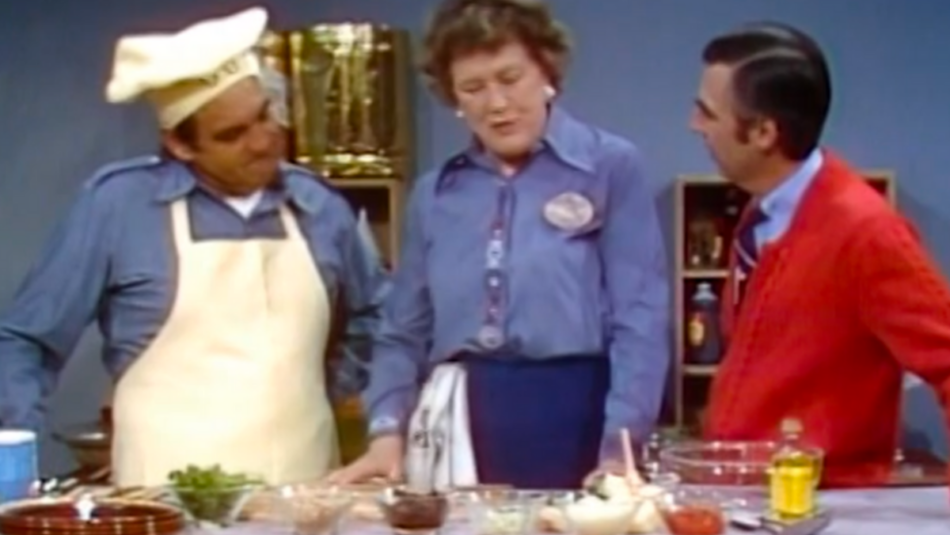Julia Child and Fred Rogers were titans of public television, celebrated for their natural warmth, the ease with which they delivered important lessons to home viewers, and, for a certain sector of the viewing public, how readily their personalities lent themself to parody.
Child’s cooking program, The French Chef, debuted in 1963, and Roger’s much beloved children’s show, Mister Rogers Neighborhood, followed five years later.
Rogers occasionally invited accomplished celebrities to join him for segments wherein they demonstrated their particular talents:
With our guest’s help, I have been able to show a wide diversity of self-expression, the extraordinary range of human potential. I want children and their families to know that there are many constructive ways to express who they are and how they feel.
In 1974, Child paid a call to the neighborhood bakery presided over by “Chef” Don Brockett (whose later credits included a cameo as a “Friendly Psychopath” in Silence of the Lambs…)
The easy-to-prepare pasta dish she teaches Rogers – and, by extension, his “television friend” – to make takes a surprisingly optimistic view of the average pre-school palate.
Red sauce gets a hard pass, in favor of a more sophisticated blend of flavors stemming from tuna, black olives, and pimentos.
Brockett provides an assist with both the cooking and, more importantly, the child safety rules that aren’t always front and center with this celebrity guest.
Child, who had no offspring, comes off as a high-spirited, loosey-goosey, fun aunt, encouraging child viewers to toss the cooked spaghetti “fairly high” after adding butter and oil “because it’s dramatic” and talking as if they’ll be hitting the supermarket solo, a flattering notion to any tot whose refrain is “I do it mySELF!”
She wisely reframes tasks assigned to bigger, more experienced hand – boiling water, knife work – as less exciting than “the fancy business at the end”, and makes it stick by suggesting that the kids “order the grown ups to do what you want done,” a verb choice the ever-respectful Rogers likely would have avoided.
As with The French Chef, her off-the-cuff remarks are a major source of delight.
Watching his guest wipe a wooden cutting board with olive oil, Rogers observes that some of his friends “could do this very well,” to which she replies:
It’s also good for your hands ‘coz it keeps ‘em nice and soft, so rub any excess into your hands.
She shares a bit of stage set scuttlebutt regarding a letter from “some woman” who complained that the off-camera wastebasket made it appear that Child was discarding peels and stems onto the floor.
She said, “Do you think this is a nice way to show young people how to cook, to throw things on the floor!?” And I said, “Well, I have a self cleaning floor! …The self cleaning is me.”
(Rogers appears both amused and relieved when the ultimate punchline steers things back to the realm of good manners and personal responsibility.)
Transferring the slippery pre-cooked noodles from pot to serving bowl, Child reminisces about a wonderful old movie in which someone – “Charlie Chaplin or was it, I guess it was, uh, it wasn’t Mickey Rooney, maybe it was…” – eats spaghetti through a funnel.
If only the Internet had existed in 1974 so intrigued parents could have Googled their way to the Noodle Break at the Bull Pup Cafe sequence from 1918’s The Cook, starring Roscoe “Fatty” Arbuckle and Buster Keaton!
The funnel is but one of many inspired silent spaghetti gags in this surefire don’t-try-this-at-home kid-pleaser.
We learn that Child named her dish Spaghetti Marco Polo in a nod to a widely circulated theory that pasta originated in China and was introduced to Italy by the explorer, a bit of lore food writer Tori Avey of The History Kitchen finds difficult to swallow:
A common belief about pasta is that it was brought to Italy from China by Marco Polo during the 13th century. In his book, The Travels of Marco Polo, there is a passage that briefly mentions his introduction to a plant that produced flour (possibly a breadfruit tree). The Chinese used this plant to create a meal similar to barley flour. The barley-like meal Polo mentioned was used to make several pasta-like dishes, including one described as lagana (lasagna). Since Polo’s original text no longer exists, the book relies heavily on retellings by various authors and experts. This, combined with the fact that pasta was already gaining popularity in other areas of Italy during the 13th-century, makes it very unlikely that Marco Polo was the first to introduce pasta to Italy.
Ah well.
We’re glad Child went with the China theory as it provides an excuse to eat spaghetti with chopsticks.
Nothing is more day-making than seeing Julia Child pop a small bundle of spaghetti directly into Fred Rogers’ mouth from the tips of her chopsticks…though after using the same implements to feed some to Chef Brockett too, she realizes that this wasn’t the best lesson in food hygiene.
In 2021, this sort of boo-boo would result in an automatic reshoot.
In the wilder, woolier 70s, a more pressing concern, at least as far as public television was concerned, was expanding little Americans’ worldview, in part by showing them how to get a commanding grip on their chopsticks. It’s never too late to learn.
Bon appétit!
JULIA CHILD’S SPAGHETTI MARCO POLO
There are a number of variations online, but this recipe, from Food.com, hews closely to Child’s original, while providing measurements for her eyeballed amounts.
Serves 4-6
INGREDIENTS
1 lb spaghetti
2 tablespoons butter
2 tablespoons olive oil
1 teaspoon salt black pepper
1 6-ounce can tuna packed in oil, flaked, undrained
2 tablespoons pimiento, diced or 2 tablespoons roasted red peppers, sliced into strips
2 tablespoons green onions with tops, sliced
2 tablespoons black olives, sliced
2 tablespoons walnuts, chopped
1 cup Swiss cheese, shredded
2 tablespoons fresh parsley or 2 tablespoons cilantro, chopped
Cook pasta according to package directions.
Drain pasta and return to pot, stirring in butter, olive oil, and salt and pepper.
Toss with remaining ingredients and serve, garnished with parsley or cilantro.
Related Content
Julia Child Shows David Letterman How to Cook Meat with a Blow Torch
Watch Anthony Bourdain’s First Food-and-Travel Series A Cook’s Tour Free Online (2002-03)
Tasting History: A Hit YouTube Series Shows How to Cook the Foods of Ancient Greece & Rome, Medieval Europe, and Other Places & Periods
Science & Cooking: Harvard’s Free Course on Making Cakes, Paella & Other Delicious Food
MIT Teaches You How to Speak Italian & Cook Italian Food All at Once (Free Online Course)
– Ayun Halliday is the Chief Primatologist of the East Village Inky zine and author, most recently, of Creative, Not Famous: The Small Potato Manifesto. Follow her @AyunHalliday.










